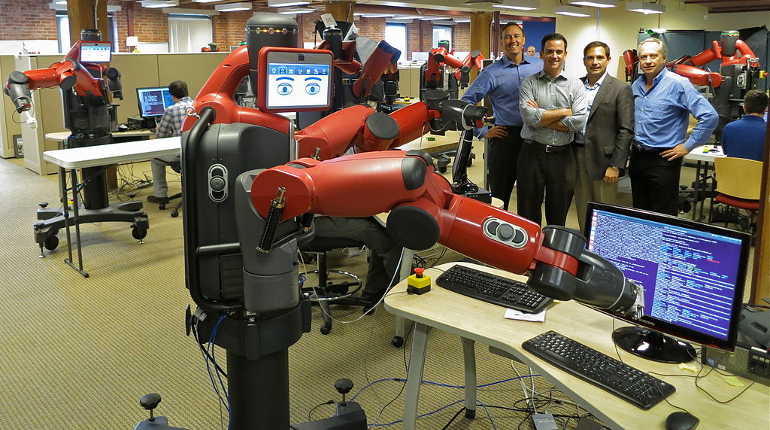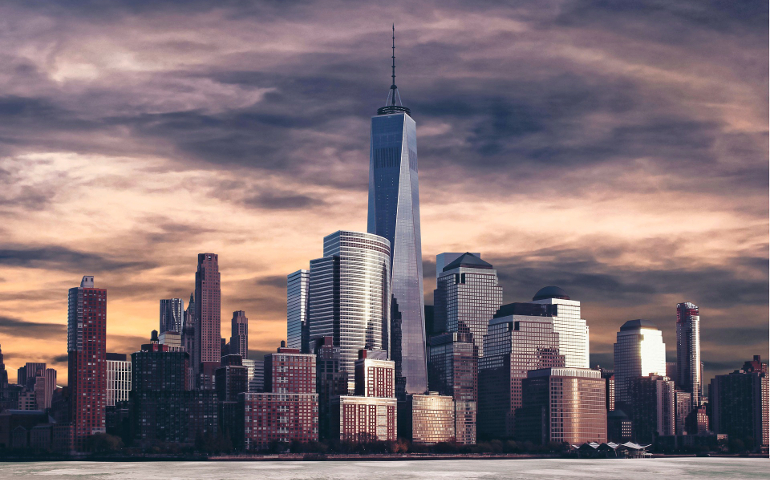
10 Emerging Mega-Trends: Are you prepared for a new world?
The world we are living is about to change. Are you prepared for a brave new world?
Even though things seem to stay the same on a daily basis, in reality they are always in flux and prone to change.
This truism was clearly understood even from the ancient Greek times when one of the greatest philosophers declared:
“The Only Constant in Life is Change.”
– Heraclitus of Ephesos
This continual change is taking place on a micro-level, e.g. for single individuals, but also on a macro-level, e.g. the whole universe.
Life changes every day for every person in some minor way so that it goes unnoticed. The accumulated changes, however, create a vector of huge change.
This is also true on a larger scale. Changes occur on various countries of the world and seem to be minor, but their aggregation has as a result massive changes in the world as we know it.
The sooner you understand that the current conditions of life are only temporary and are about to change, the better you will be prepared for the future and the upcoming challenges of it.
Want to get this article as a nice PDF ebook? Download it below!
Changes, Trends and Mega-Trends
In our current lifetime, gigantic changes are about to occur.
These are what I like to call “Mega-Trends” or “Super-Trends”.
Mega-trends are huge trends that take years, even decades, to fully unfold and they have impact on a huge portion of the global population, perhaps even the whole world.
Sometimes these super trends are materializing “below the radar”, until their influence is so massive that they cannot be ignored.
If you are not prepared for the upcoming changes, you will get caught in the wrong side of the trends. This has happened to individuals times and times again in the past.
A classic example is the replacement of horses by cars. Nobody could predict that a “machine” could ever be used to transport people instead of horses. Yet, this is exactly what happened, destroying the “industry” of house carriage owners.
The most representative example of a recent mega-trend is the rise of the Internet. The Internet was “invented” a few decades ago.
In the beginning, nobody could fathom the enormous impact the Internet would have in our lives. Yet, few years fast forward, it has profoundly altered the way we live and it is essentially impacting the whole humanity.
The Internet has disrupted or “destroyed” a great number of industries. From stock brokers and traditional newspapers, to accommodation and transportation. Its great force will continue to influence our world for many years to come.

Raising your awareness
The good thing is that mega-trends do not transpire overnight, it is impossible. Their unfolding extends over years, even decades, and this gives you the chance to get prepared for the new status quo.
The way to notice these massive trends is to develop an awareness and a “meta-awareness”.
By awareness I mean that you should have a knowledge of the current events, but also an understanding of what is truly going on behind the scenes. For instance, you should be informed about recent political, geopolitical, business and financial news. However, this is not enough on its own. You should understand why things are happening.
For example, the news that Facebook has bought Instagram and later Whatsapp, are facts you should know. Additionally, you should also understand what Facebook is really doing: trying to dominate the social media universe.
A “meta-awareness” is taking things a step further. It is the state of accumulating pieces of information from various sources over time, and using them to extrapolate trends and make assessments and useful conclusions.
For example, “meta-awareness” would be to notice that the vast majority of the companies that have grown to great levels over the past years are tech ones, thus you should invest in them (if it makes financial sense) or even start your own online business.
The bottom line here is that we should always remain alert and observant of brewing changes. We cannot afford to get complacent and comfortable with the current status because sooner or later, it is going to change. It is not a question of “if”, but rather “when”.
“Success breeds complacency. Complacency breeds failure. Only the paranoid survive.”
These Mega-Trends are going to change the world soon
After discussing what Mega-trends are, I would like to share some observations and projections of my own. These are based on experiences I have had, information I have gathered and the awareness I have built.
So here are some of the huge upcoming trends that I see coming:
1. Population exploding and Urbanization spreading
In the recent few centuries, things have been going well for the human species on a macro-level. We have colonized the whole world and our population is rapidly expanding.
According to a 2015 UN report, the world population of 7.3 billion (as of mid-2015) is expected to reach 8.5 billion by 2030, 9.7 billion in 2050 and 11.2 billion in 2100.
This population boom is not distributed uniformly across the globe though, but is mainly concentrated in specific parts of the world.
Developed countries, like the United States and those in Europe, see their populations rising very slowly, or even shrinking.
On the other hand, developing countries in Asia, Africa and Latin America have high rates of population growth. Indicatively, India is expected to become the largest country in population size, surpassing China around 2022, while Nigeria could surpass the United States by 2050.
This huge population increase unfortunately brings its own set or problems.
The most alarming one is the fact that we are in danger of overpopulating Earth.

In a 2011 United Nations report named “Global Environment Outlook 4”, the warning is clear:
“Human consumption had far outstripped available resources. Each person on Earth now requires a third more land to supply his or her needs than the planet can supply.”
On the same note, the Worldwatch Institute said in 2006 that the booming economies of China and India are “shaping the global biosphere”. The report states:
“The world’s ecological capacity is simply insufficient to satisfy the ambitions of China, India, Japan, Europe and the United States as well as the aspirations of the rest of the world in a sustainable way.”
As a side effect of population increase, urbanization is also spreading. Urban population refers to people living in urban areas as defined by national statistical offices. It is impossible to sustain such large amounts of population, unless they are concentrated in small geographic areas.
The United Nations Population Fund states:
“The world is undergoing the largest wave of urban growth in history. More than half of the world’s population now lives in towns and cities, and by 2030 this number will swell to about 5 billion. Much of this urbanization will unfold in Africa and Asia, bringing huge social, economic and environmental transformations.”
Of course, human beings have not evolved to live in cities and metropolises, so urban life tends to be stressful and even dehumanizing.
Make no mistake. Urbanization is going to be a dominating force moving people towards big cities and metropolitan areas, and creating needs that will have to be covered by businesses and entrepreneurs.
2. Technology will even more massively influence our lives
It is rather obvious that technology has played a major role in molding modern life, especially after the Industrial Age and during the more recent Information Age.
Its impact on the world will definitely continue. Not only that, the changes that will cause will be even more massive. What is interesting is this:
Technological change is not linear, but exponential.
In his famous essay, “The Law of Accelerating Returns”, futurist Ray Kurzweil states:
“An analysis of the history of technology shows that technological change is exponential, contrary to the common-sense “intuitive linear” view. So we won’t experience 100 years of progress in the 21st century — it will be more like 20,000 years of progress (at today’s rate). The “returns,” such as chip speed and cost-effectiveness, also increase exponentially. There’s even exponential growth in the rate of exponential growth.”
This is arguably difficult to comprehend and fathom, but seems to be aligned with the progress made the past few decades.
Let’s now focus on the business world, where technology is becoming increasingly important.
As I mentioned before, the majority of the greatest companies that have emerged in the recent years are technology based. This pattern will continue and even expand in the coming years.
Technology companies are much easier to automate and scale, something that leads to a rapid accumulation of wealth. No wonder why they are preferred by modern entrepreneurs.
Technology and business are getting more coupled and intertwined. In fact, technology can provide a serious competitive advantage for a business that knows how to leverage it.
For this reason, from a business perspective, technology savviness is becoming more and more of significance.
If you’re an entrepreneur today, you can’t afford to be “technology illiterate”.
This is one more reason why you should be aware (and “meta-aware”) of developments in the technology world. Disruption in business usually comes after a significant technological breakthrough or improvement.
“Change before you have to.”
3. The rise of the Internet will continue
As we mentioned, the Internet has been the greatest mega-trend of recent years, essentially changing the world and the way we live. However, its predominance has not been completed yet.
The Internet will continue to disrupt and destroy traditional and obsolete industries. The recent examples are abundant. AirBnB disrupting the hotel industry, Uber disrupting the taxi/cab industry, and so on.
In fact, the Internet is going to serve as a platform on which other mega-trends are going to play out, for example the mega-trend of globalization that we will examine below.

On the technical side, the larger development to be coming soon is the Internet of Things.
From Forbes:
“Simply put this is the concept of basically connecting any device with an on and off switch to the Internet (and/or to each other). This includes everything from cell phones, coffee makers, washing machines, headphones, lamps, wearable devices and almost anything else you can think of.”
This will undoubtedly breed a huge number of new exciting applications causing a boom similar to the one we saw in the recent years with the smartphone revolution initiated by Apple and spread by Google’s Android.
I mentioned it before, but will repeat here, because it is of major importance:
You have to be technology and internet savvy especially if you want to become an online entrepreneur.
Bottom line here is that the world is soon going to live almost exclusively on the Internet. Expect that and prepare accordingly.
4. Globalization spreading like a wildfire
Globalization is the process of international unification which occurs as a result of the exchange of concepts, products, capital, ideas, labor and other aspects of culture among various countries in the world.
As the International Monetary Fund (IMF) states in its 2000 paper, “Globalization: Threat or Opportunity?”, there are four basic aspects of globalization:
- product/services trade and transactions
- capital and investment flows
- migration and movement of people
- distribution of knowledge
One more aspect I would like to add is the “transfer of labor”, something that is achieved by outsourcing jobs or projects to foreign countries with cheaper workforce. This can happen both physically, with companies moving part of their infrastructure to other countries, and virtually, with the assignment of work remotely over the Internet.
Globalization boils down to having countries look more and more like each other, until they are characterized by total uniformity and homogeneity. It usually comes with the abandonment of each country’s traditional culture in favor of a more dominant one originating from another country over the globe.
Unfortunately, when we talk about “Globalization”, most of the times we are really talking about “Westernization”. This is the process whereby countries over the world adopt and mimic Western values and ideas, like those found in Northern European countries and the United States.
Here are some real life examples.
I was recently in Slovakia for a week of vacation (and some kick-ass geoarbitrage). What really surprised me was to find that in this small country found in Central Europe, people were celebrating the Halloween. A little research showed that several European countries started to observe the Halloween after the 1990s under the influence of the US culture, and it is more popular among the younger generations.
On the same spirit, in my home country Greece, a lot of stores recently introduced special deals for the occasion of the Black Friday, following their US counterparts. Black Friday is the day following the Thanksgiving Day and it is a holiday specific only to the United States, but hey, we are talking about consumerism here.
As the IMF perfectly stated, globalization poses both threat and opportunities. It will create a threat for those that are not accordingly prepared, but it will also offer opportunities to those that have the awareness to spot them.
Soon, we will not be citizens of a specific country, but citizens of the world.
Be prepared for the upcoming changes and make sure to grab opportunities that will come along.
5. Large scale automation coming
Automation refers to the use of control systems for operating equipment such as machinery, networks and other applications with minimal or reduced human intervention.
Automation has been achieved by various means including mechanical, hydraulic, electrical, electronic devices and computers, usually in combination. Complicated systems, such as modern factories, airplanes and ships typically use all these combined techniques.
Some basic forms of automation can be found as early as in the Industrial revolution. Advances were also made during the early 1900s with Ford’s assembly line.
The huge movement forward however was during the 1970s when the Distributed Control System (DCS) as well as the Programmable Logic Controller (PLC) were invented.
Another enormous boost in automation was achieved by the proliferation of computer systems and the rise of, you guessed it, the Internet.
Automation is preferred by businesses because it saves labor, energy, materials and improves quality, accuracy and precision.
All this time, automation has been gaining ground in the world of business, causing people to be replaced by more efficient machinery.
This pattern will definitely continue and most probably accelerate. As I like to say often:
“What CAN be automated, WILL be automated”

Image Source: Steve Jurvetson
Automation has been correlated with unemployment, and rightly so.
In a 2013 research from Oxford Martin School called “The Future of Employment”, authors examine how susceptible jobs are to computerization.
Here is an alarming conclusion:
“The impact of computerisation on labor market outcomes is well-established in the literature, documenting the decline of employment in routine intensive occupations – i.e. occupations mainly consisting of tasks following well-defined procedures that can easily be performed by sophisticated algorithms.”
The research gets even more specific and states that:
“According to estimates, about 47 per cent of total US employment is at risk (due to computerisation).”
Based on that research, BBC has created a tool where you can plug-in your job and find out the likelihood that it could be automated within the next two decades.
So how can you protect yourself from this massive trend?
The first line of defense in the workplace is to have a skillset that requires significant intellect and a high degree of sophistication.
If you think you can depend on a McJob for the rest of your life, you are in for a rude awakening.
Alternatively, you could depend on jobs that require “soft skills” and are related to dealing with people on a more personal basis, something that robots are not (yet) good at.
An even better approach though is to embrace and leverage computerisation and technology, instead of fighting it. You should use it to complement your own work in order to be more efficient in the workplace.
In his book, “Zero to One”, Billionaire entrepreneur and investor Peter Thiel writes:
“Now think about the prospect of competition from computers instead of competition from human workers. On the supply side, computers are far more different from people than any two people are different from each other: men and machines are good at fundamentally different things. People have intentionality—we form plans and make decisions in complicated situations. We’re less good at making sense of enormous amounts of data. Computers are exactly the opposite: they excel at efficient data processing, but they struggle to make basic judgements that would be simple for any human.”
He then goes on to provide examples on how technology could be used in a complementary fashion in order to make workers more effective and more efficient:
“Think of what professionals do in their jobs today. Lawyers must be able to articulate solutions to thorny problems in several different ways—the pitch changes depending on whether you’re talking to a client, opposing counsel, or a judge. Doctors need to marry clinical understanding with an ability to communicate it to non-expert patients. And good teachers aren’t just experts in their disciplines: they must also understand how to tailor their instruction to different individuals’ interests and learning styles. Computers might be able to do some of these tasks, but they can’t combine them effectively. Better technology in law, medicine, and education won’t replace professionals; it will allow them to do even more.”
As he mentions, the correct question to ask is:
“How can computers help humans solve hard problems?”
The optimal approach however is to be an “owner” of automation and technology, and use it to build a business enterprise of yours. You can obtain ownership of technology either by creating it and keeping it as Intellectual Property (easier said than done) or purchasing it from the marketplace.
Your line of thinking as an entrepreneur is to always investigate how to use technology and automation in order to create a more efficient and scalable business.
“The first rule of any technology used in a business is that automation applied to an efficient operation will magnify the efficiency. The second is that automation applied to an inefficient operation will magnify the inefficiency.”
– Bill Gates
6. Pension system / Social security getting annihilated
In most countries of the world, there is a system in place responsible for supporting people of older age after they retire.
The concept is simple: during his employment years the individual makes payments to the system, and after retirement from work the individual draws payments from the system.
The pension funds are run by the government in order to provide income to their citizens when they retire and were created to ensure social aid to the most vulnerable.
In the United States, Social Security was initiated at 1935 as an attempt to mitigate the dangers in American life, including old age, poverty, unemployment and the burdens of widows and fatherless children. Remember that the US were coming out of the stock market crash of 1929 and a severe subsequent depression.
The establishment of Social Security appears to have been based on noble motives. However, over the course of time, it seems that it has devolved in a way that governments can indiscriminately loot the available funds for other purposes.
Additionally, Social Security has been criticised as being essentially a Ponzi scheme.
From Wikipedia:
“A Ponzi scheme is a fraudulent investment operation where the operator, an individual or organization, pays returns to its investors from new capital paid to the operators by new investors, rather than from profit earned by the operator.”
Social Security does pretty much the same thing. Receives new funds from workers (new “investors”), pays the retired people (old “investors”) and of course keeps a little of it for all the trouble.
The second largest inherent problem rises from the fact that the average lifespan has dramatically increased since the inception of the system. This means that people have now to be supported much more years after they are retired. This is the main reason why governments push retirement age higher and higher.
The combination of the Ponzi scheme design and the increase in lifespan is lethal.
From Forbes:
“What rational person would devise a system that encourages people to believe they will get benefits 45 years in the future, knowing all along that the payment of benefits depends on future taxpayers — but without knowing what the fertility rate will look like a half century later and therefore without knowing how many future taxpayers there will be? In short, what rational person would devise an entire retirement system, using the same techniques that Bernie Madoff used to scam his investors?”
The end result is that things are not going well for the system.
The New York Times write:
“Social Security plans for solvency over 75 years, but because of demographic pressures and the weak economy, it is currently solvent only until 2033. After that, without reforms, it would pay about 75 percent of promised benefits.”
Please note that these problems appear in the United States, the greatest economy in the world. Other countries, even in developed Europe, are going to face much stronger pressures.
The answer to all these is of course to build long lasting wealth during your young, most productive years, so you can have safety later on. You cannot depend on anyone other than yourself, and certainly not your government.
7. Rise of the middle class internationally
You hear it everywhere: “The middle class is shrinking”. Right?
Well, not exactly.
The correct statement is that “The middle class is shrinking in the Western countries”.
For example, in the United States, each of the 50 states has seen its share of middle-class families shrink from 2000 to 2013, mainly because of stagnant incomes and rising housing costs.
But remember, there is a massive trend called Globalization, so we have to examine the rest of the world too. And things are much different there.
From Reuters:
“For the first time in history, a truly global middle class is emerging. By 2030, it will more than double in size, from 2 billion today to 4.9 billion. Brookings Institution scholar Homi Kharas estimates that the European and American middle classes will shrink from 50 percent of the total to just 22 percent. Rapid growth in China, India, Indonesia, Vietnam, Thailand, and Malaysia will cause Asia’s share of the new middle to more than double from its current 30%. By 2030, Asia will host 64% of the global middle class and account for over 40% of global middle-class consumption.”
This means that, in absolute numbers, more and more people are going to have the monetary means to buy the products and services that you might be selling as an entrepreneur and business owner.

As the report also mentions, the majority of new members of the middle class in the next 20 years will come from the hundreds of millions of Chinese and Indians who are going to find themselves with more disposable income than their previous generations.
This is the reason that large corporations like Starbucks and McDonald’s are rapidly expanding in these Asian countries in order to be able to capture significant market share before competition kicks in.
So, what is the thinking process you should have relative to this? I can sum it up in one phrase:
“When it comes to building wealth, think globally.”
This major global shift of purchasing power will create opportunities never seen before, and entrepreneurs over the world are going to benefit and gain from it.
8. Africa is going to be the next China
Another disrupting mega-trend is taking place in one of the most forgotten and abandoned continents of all, Africa.
Africa is extremely rich in natural resources, yet its people are ridden by poverty. The main reason is the systematic and organized looting that is taking place for centuries by countries and corporations of the west.
In the recent years however, money flows in as investments both from sovereign funds as well as corporations.
For example, China is investing heavily in the continent, not only in natural resources, but also in services and manufacturing.
Additionally, business giants like Coca-Cola and alcoholic beverage manufacturer Diageo are betting with their money on the future of the continent.
Inbound funds flow has been extensive and is going to have a positive effect in the receiving countries. This does not necessarily mean that wealth will be distributed equally (it won’t), but the overall quality of life is expected to rise. In fact, it is expected that by 2060, Africans living below the poverty line will be in the minority (33%).
Remember the “middle class rising” mega-trend? Well, Africa has the fastest growing middle class in the world. Sure, we are talking about people spending about $2-20 a day, but this is a huge increase from only a few years ago.
In my mind, Africa is where China was a few decades ago. Massive, unorganized, underutilized, but with a huge untapped potential. Of course there are striking differences in culture, history and social structures (plus Africa is a continent comprising several countries), but they seem to follow a similar path towards growth.
On a same note, China seems to be entering a maturity phase after years of massive growth. Its economy is slowing down and its population is ageing. People are finally starting to spend more. Frankly, it reminds me a bit of Europe a couple of decades ago.
So if Africa is becoming the new China, and China is becoming the next Europe, where does that leave Europe? Good question!
9. Water scarcity and water wars
Water is crucially essential to human beings. We can barely survive a few days without access to it. So it only makes sense that human societies and civilizations flourished in areas that had abundance of water.
Unfortunately, due to the unequal distribution of water on the earth’s surface, some areas of the world are facing scarcity of water. This leads to water conflicts among countries and populations over both saltwater and freshwater, especially the latter. The most notable example is the Middle East, which has only 1% of the world’s freshwater shared among 5% of the world’s population.
The combination of growing populations in water-short regions of the world and an increase in temperature over the last years causes multiple countries to face acute hydrological shortage, simply not enough water to satisfy basic human needs.
Since water is in high and rising demand, and its supply is constant (or even declining), the result is a predictable clash of interests.
According to water experts at the World Resources Institute:
“Water is likely to cause the most conflict in areas where new demands for energy and food production will compete with the water required for basic domestic needs of a rapidly growing population”.
To make things even more complicated, the private sector is not standing idle in these water-related conflicts. Wherever there is a supply-demand case, profit is to be made and private businesses would gladly participate to that.
Corporations have set in motion forces that will allow them to have control over the water resources. Unfortunately the path is clearly paved towards that direction.
As of recently, many US states, including Utah, Washington and Colorado, have outlawed individuals from collecting rainwater on their own properties because, apparently, that rain belongs to someone else.

On the same note, the CEO of Nestlé, the largest food product manufacturer, famously declared a few years ago that “access to water should not be a public right”, setting the tone for what is going to follow over the next years.
I am not sure how this mega-trend could or should be approached. The only thing that is certain is that the more resources an individual has, the more flexible he is to maneuver in these dangerous “waters”.
10. Population is rapidly ageing in developed countries
During the past 60 years, human life expectancy has enormously increased from 48 to over 67 years, more than doubling from the 31 years of the early 1900s. This is undoubtedly great news for humanity, but does not come without its set of issues.
The biggest issue is the rapidly ageing population in the majority of the developed countries. This creates an array of socio-economic challenges, mainly related to reduced workforce participation and of course the pension system instability we discussed previously.
In short, there are fewer young people that are actively working, and these workers have to contribute to the support of the expanding older generation which has left the workforce many years ago.
This is a huge demographic problem appearing in developed countries of Europe and it is partially mitigated by the inflow of immigrants which prevent a labor shortage. The same thing is happening in the United States with immigration from Mexico and Latin America countries.
Even China’s population is slowly ageing with the percentage of people aged 65 years and over rising from 5.5% in 1990 to a predicted 13.3% in 2025 and 23%, or 114 million, by 2050. This has led the government to recently ease family planning restrictions to allow all couples to have two children after decades of a strict one-child policy.
The most notable example however is Japan. Japan is a unique case due to the subtleties of its culture.
One one hand, Japan has the highest life expectancy of any major country. In fact, the life expectancy for men and women in Japan in 2014 is the highest ever recorded, according to a report released by the Ministry of Health, Labor and Welfare.
Japan’s elderly population, aged 65 or older, comprised 20% of the nation’s population in June 2006, a percentage that is forecast to increase to 38% by 2055.
The country has yet to confront demographic time bomb of ageing population. Financial Review states:
“As a result of this ageing population, total spending on social security was almost 110 trillion yen ($1.17 trillion) in the 2012 fiscal year – 22.8 per cent of gross domestic product.”
The problem is magnified by the fact that Japanese culture is heavily biased against immigration. The country stands by its immigration controls despite the shrinking population and the pending fiscal crisis. The result is a perpetually weak economy, looming deflation and multiple recessionary periods over the last decades.
These are some heavy forces against Japan, and other developed countries for that matter. If you find yourself living in one of those, you need to seriously reassess your expectations about the support you are going to receive by your government during your elder years and start building wealth right now.

Conclusion
In this article, we discussed some of the most prominent, large scale trends that are going to alter the world and affect our lives in the coming years.
The10 mega-trends discussed are as follows:
1. Population exploding and Urbanization spreading
2. Technology will even more massively influence our lives
3. The rise of the Internet will continue
4. Globalization spreading like a wildfire
5. Large scale automation coming
6. Pension system / Social security getting annihilated
7. Rise of the middle class internationally
8. Africa is going to be the next China
9. Water scarcity and water wars
10. Population is rapidly ageing in developed countries
Apart from the huge mega-trends we explored above, there are definitely many others of smaller scale that will also impact our world in the near future, so make sure to keep an eye on them too.
Closing, I would like to note that most of the trends mentioned are not favourable to the average individual out there. The countermeasure is to break free from modern slavery and start acquiring wealth that will help you protect the interests of yourself and your family.




